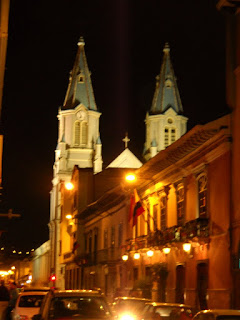Climbing onto a bus in Ecuador is always an adventure. You never know what might happen in the next few minutes, or hours, of your time in that enclosed space. There's always the cute little babies on their mother's laps--cooing, making faces, and sometimes crying. Then there are the school children dressed in their uniforms, which come in every color of the rainbow (although mainly blue, red, black, and yellow). For girls the uniform is usually a short pleated skirt with knee-high socks and some schools make the boys wear full suits. I always am amused by the 10-year-old boys who look like they just came out of a board meeting.
Beyond the normal--the people sitting or standing, waiting to get home--there are sometimes unusual events that just make me want to laugh.
Street vendors aren't the only informal business feature of Ecuador. There are also what can best be described as "bus vendors." These people wait at the major bus stops to ride a bus to the next major stop, and since my route to Quito is a relatively uninterrupted 20 minutes long with few stops and distractions, it is a favorite for bus vendors. You might be able to best understand the experience as a live, moving infomercial. Here's one of my favorites:
Guy gets on bus and introduces himself, "Sorry for the inconvenience or for making you uncomfortable. Some of you might not want to listen to me, but thanks for listening anyway [as if we have a choice...talk about a captive audience]. Many youth my age are stuck in drugs and alcohol and gangs. I used to do that once, but now I've turned my life around and am working in a dignified manner to feed my wife and 9 children [okay, so maybe only 2 kids]."
"As you all know, we Ecuadorians love greasy fast food--hamburgers, french fries, hot dogs, etc. You know it's bad for your health, but did you know that it can cause hepatitis A, hepatitis B, prostate cancer, and many other diseases?" [insert here a long, non-scientific explanation of the connection between hamburgers and prostate cancer].
Now for the kicker:
"Do not worry, today I am selling this bag of tea made from natural sources that will clean out all the grease and fat and save you from hepatitis and prostate cancer. For the low price of 50 cents [you can miraculously buy a healthy life]."
Good thing I don't get my medical advice from bus vendors.
Some other good ones:
Last Friday I was headed up to Quito when traffic came to a standstill right before "la bomba" in Miravalle. Let's just say that we were 5 minutes into a 20 minute ride. After waiting 10 minutes and not moving an inch, the bus driver decided to make a 3-point, ahem, 9-point turn across 4 lanes of traffic. We returned from whence we came and then took a cobblestone street up to the highway connection. All the way back down the hill the cobrador flailed his arms anytime another bus passed, trying to get them to turn around. The question is--since there are no cross streets on that stretch, how were they going to turn around? Another 7 buses doing 9-point turns? That's something I'd like to see.
One weekday on my way to work I was riding the Ecovia line. A little girl, perhaps 5 years old was sitting right by me on her mom's lap. She looked at me for a while and then all of a sudden she started telling her mom in English, "I love you. I love you. I love you." She paused for a second and then asked her mom in Spanish, "What does that mean?" Well, I'm glad the presence of a gringa caused that little girl to express her love for her mama, even if she didn't know what she was saying in my language.
That's Ecuador for you--rarely a dull moment on a bus.





















